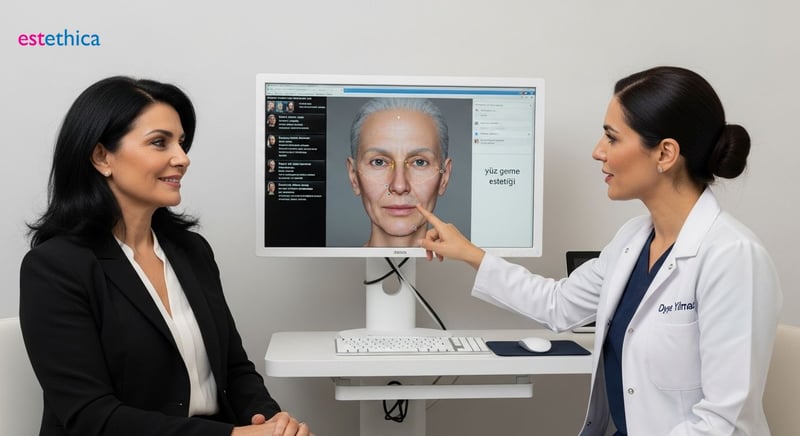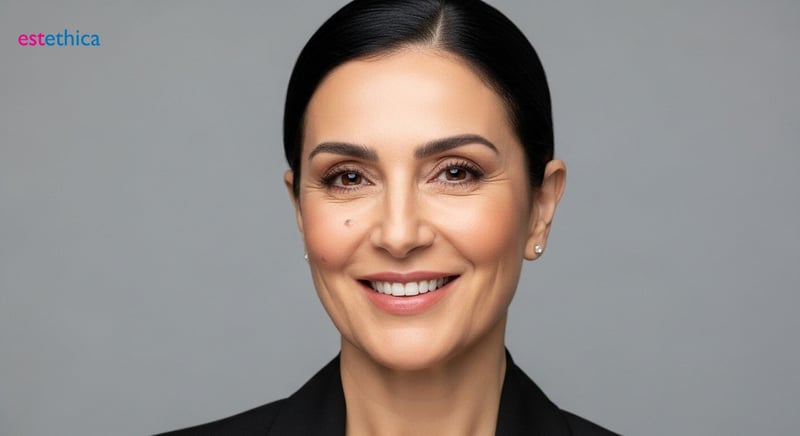Facelift & Facial Rejuvenation: Renew Your Youthful Appearance
Explore comprehensive insights into facelift procedures (rhytidectomy) for effective facial rejuvenation, detailing surgical and non-surgical options, the crucial role of a plastic surgeon, and recovery guidance for a refreshed, youthful look.
Understanding Rhytidectomy: What to Expect
What is a Rhytidectomy?
A rhytidectomy, more commonly known as a facelift, is a comprehensive surgical procedure designed to address the visible signs of aging in the face and neck. It effectively reduces sagging of the cheeks and jawline, aiming to restore a more youthful and refreshed appearance. This sophisticated technique involves tightening the underlying facial muscles and tissues, followed by carefully redraping the skin to achieve smoother contours and a firmer profile. A skilled aesthetic professional meticulously customizes the rhytidectomy approach to suit each individual's unique concerns, whether that involves addressing jowls, deep lines extending from the nose to the mouth (nasolabial folds), or a loss of definition along the jaw. Understanding the full scope of what this procedure can achieve is vital for establishing realistic expectations.
This type of surgical intervention can effectively treat laxity in the mid-face, lower face, and neck. Often, it is performed in conjunction with other procedures, such as eyelid surgery or brow lifts, to create a more complete and harmonious enhancement of the entire facial structure. Many individuals opt for a rhytidectomy to counteract the effects of gravity, cumulative sun exposure, and genetic predispositions that contribute to an aged appearance. The primary objective is not to drastically alter one's natural features but rather to restore a look that is more rested, vibrant, and naturally youthful. As with any significant medical decision, discussing your specific aesthetic goals and concerns thoroughly with your surgeon will be instrumental in determining if a rhytidectomy is the most suitable path for achieving your desired outcomes. It's important to approach such procedures with a clear understanding, much like when considering other complex treatments, such as those detailed in Understanding Gynecomastia: Your Guide to Male Breast Reduction, where detailed information is key to informed choices.
The Facelift Procedure and Its Goals
The primary goal of a facelift is to turn back the clock on facial aging by addressing sagging skin and underlying tissues. It is a powerful tool for rejuvenation, providing results that are typically more dramatic and longer-lasting than non-surgical alternatives. The procedure involves making incisions, usually hidden within the hairline and natural creases of the face, allowing the surgeon access to reposition deeper facial structures. The skin is then gently lifted and redraped, with excess skin removed. While the term "facelift" is widely recognized, the technical term, rhytidectomy, emphasizes the removal of wrinkles and sagging skin. Patients seeking this intervention are often looking to correct drooping cheeks, a less defined jawline, or deep creases that make them appear tired or older than they feel. The aim is always to enhance, not to fundamentally change, your appearance, ensuring you still look like yourself, just a more refreshed version.

The Role of a Skilled Plastic Surgeon in Your Facelift Journey
The success of any facelift procedure hinges significantly on the expertise and skill of the plastic surgeon you choose. This complex operation, formally known as a rhytidectomy, requires a deep understanding of facial anatomy, a precise surgical hand, and a keen artistic sense to achieve naturally beautiful results that enhance, rather than alter, your inherent features. A board-certified specialist in this field possesses the comprehensive knowledge and refined techniques essential for tailoring the procedure to your unique facial structure, skin quality, and specific aging concerns. They are adept at identifying the subtle nuances of your face and devising a personalized surgical plan designed to address sagging skin, deep wrinkles, and loss of facial volume effectively.
Finding the Right Expert for Optimal Results
Beyond technical proficiency, an exceptional plastic surgeon prioritizes your safety and ensures open, transparent communication throughout your entire journey. They will conduct a thorough evaluation, meticulously explaining the potential risks and benefits associated with the facelift procedure. Furthermore, they will clearly outline the expected recovery timeline and provide detailed post-operative care instructions, ensuring you are fully informed and feel confident at every step. Their commitment extends to managing your expectations, discussing what a realistic outcome looks like, and answering all your questions, no matter how small they may seem. This collaborative approach fosters a strong patient-surgeon relationship, which is vital for a successful and satisfying experience. Remember, your chosen surgeon's experience in various facial rejuvenation techniques is paramount. It is highly recommended to review their portfolio of before-and-after photos, research their credentials, and schedule a consultation to gauge their philosophy and communication style. A skilled practitioner can also advise on complementary procedures, such as those detailed in Revitalize Your Neck: Neck Lift Options for Youthful Contour, ensuring a harmonious and comprehensive enhancement of your overall appearance.
The Art and Science of Facial Sculpting
Choosing the right specialist is not merely about selecting a surgeon; it is about finding an artist and a scientist who can artfully sculpt your face to restore a youthful vitality. They possess the ability to lift and reposition facial tissues with precision, creating a refreshed look that appears natural and harmonious. This often involves meticulous attention to detail in elevating the mid-face, tightening the jawline, and smoothing the neck area. A skilled practitioner understands that each patient is unique and requires an individualized approach, avoiding a one-size-fits-all methodology. Their expertise lies in understanding the underlying muscle and fat structures of the face and how they contribute to the aging process. By carefully manipulating these elements, they can achieve significant yet subtle improvements, helping you to look as young as you feel. This dedication to both the art and science of facial aesthetics ensures that your facelift procedure delivers the desired results, boosting your confidence and self-esteem.
Exploring Non-Surgical Facelift Options for Subtle Enhancement
While a surgical facelift (rhytidectomy) offers dramatic and long-lasting results, non-surgical treatments have gained significant popularity for those seeking facial rejuvenation with less downtime and lower cost. These options provide subtle improvements and can be excellent for individuals with early signs of aging or those looking to complement surgical results. Understanding the spectrum of available non-invasive procedures can empower you to make informed decisions about your aesthetic journey.
Injectables and Advanced Technologies
Injectables like dermal fillers are highly effective at restoring lost volume, plumping up the cheeks, softening nasolabial folds, and diminishing the appearance of fine lines. These treatments can provide immediate results, offering a refreshed and more youthful look. Neuromodulators, such as Botox, are specifically designed to reduce dynamic wrinkles – those lines caused by muscle movement, particularly noticeable around the eyes (crow's feet) and on the forehead. By temporarily relaxing these muscles, neuromodulators create a smoother skin surface.
Beyond injectables, advanced technologies offer further non-surgical enhancements. Laser treatments and radiofrequency therapies work by stimulating the skin's natural collagen production. Over time, this process can improve skin texture, reduce minor sagging, and enhance overall skin firmness. Treatments like Ultherapy utilize focused ultrasound energy to lift and tighten the skin by targeting deeper structural layers, offering a non-invasive approach to achieving a more lifted appearance. These modern advancements provide a versatile range of choices for enhancing your facial appearance without the commitment of surgery. For those considering other aesthetic procedures, such as reshaping the ears, resources like Otoplasty: Your Guide to Ear Surgery for Perfect Proportions can offer valuable insights.
Comparing Non-Surgical Approaches
Choosing the right non-surgical facelift option depends on your specific concerns and desired outcomes. Here's a brief comparison of some popular methods:
Consulting with a qualified practitioner can help you determine which non-surgical facelift approach best suits your individual needs and aesthetic goals for rejuvenation.

Facelift Recovery: Timeline and Essential Tips for Optimal Healing
The recovery period following a rhytidectomy is a critical phase in achieving the desired results from your facial enhancement procedure. While individual healing experiences can vary, understanding the typical timeline and meticulously following your surgeon's post-operative instructions is paramount for optimal healing and the best possible outcome. Immediately after undergoing this transformative procedure, you can anticipate some degree of swelling, bruising, and discomfort. Fortunately, these immediate side effects can be effectively managed with the pain medication prescribed by your doctor and the diligent application of cold compresses.
Immediate Post-Operative Care
Within the first few days after surgery, most patients will have their bandages removed. Any surgical drains, if utilized during the rhytidectomy, are typically removed shortly thereafter. During this initial phase, it's crucial to get plenty of rest and keep your head elevated as much as possible to minimize swelling. Gentle care of the incision sites, as instructed by your medical team, is also vital to prevent infection and promote clean healing.
Resuming Daily Activities and Long-Term Healing
As the initial recovery progresses, many individuals find themselves feeling comfortable enough to return to light daily activities and low-key social engagements within two to three weeks. However, it is strongly advised to avoid strenuous exercise and activities that could put excessive strain on your healing tissues for a longer period. Your aesthetic specialist will provide you with comprehensive guidelines regarding proper wound care, specific activity restrictions, and the schedule for your crucial follow-up appointments. Prioritizing adequate rest, maintaining a nutritious diet, and abstaining from smoking are indispensable factors that significantly contribute to promoting the body's natural healing processes. Patience is a virtue during this time; while initial improvements in your appearance may be noticeable relatively soon after the procedure, the final, refined results of your facial rejuvenation will gradually become apparent as all residual swelling subsides, which typically takes several months. Adhering strictly to your surgeon’s advice is the surest way to ensure a smooth recovery and maximize the benefits derived from your procedure. For individuals considering other body contouring procedures, understanding recovery timelines is also important, much like in the journey toward achieving a sculpted physique, akin to the process discussed in Abdominal Etching: Achieve Your Dream Six-Pack with Sculpting.

Advanced Facelift Techniques for Natural Facial Rejuvenation
Our approach to rhytidectomy, commonly known as a facelift, involves a comprehensive surgical procedure meticulously designed to address the visible signs of aging in the face and neck. We excel in tightening underlying facial muscles and tissues, followed by precisely redraping the skin to achieve smoother contours and a firmer profile, effectively reducing sagging of the cheeks and jawline.
We offer expert guidance on who is a good candidate for a facelift, ensuring that each patient's unique concerns and aesthetic goals are thoroughly understood and addressed. Our specialization extends to providing detailed information on facelift recovery time and tips, aiming for optimal healing and results.
The success of any facelift procedure hinges significantly on the expertise and skill of the plastic surgeon you choose. Our practitioners are distinguished for their deep understanding of facial anatomy and their ability to perform intricate aesthetic surgery, including neck lifts and brow lifts, to restore a youthful vitality.
We are committed to providing transparent information about what is a facelift, the procedure itself, and its goals. Patients receive comprehensive details on what to expect, including potential risks, to make informed decisions about their cosmetic surgery journey.
Expert Consultation and Personalized Facelift Recovery Guidance
Choosing the right specialist is not merely about selecting a surgeon; it is about finding an artist and a scientist who can artfully sculpt your face. We offer personalized facelift consultation experiences to detail the surgical facelift process and its benefits.
Our commitment to patient care extends to providing essential tips for optimal healing during facelift recovery. From immediate post-operative care to resuming daily activities, we guide patients every step of the way to ensure a smooth and successful recovery.
Injectables like dermal fillers are highly effective at restoring lost volume, plumping up the cheeks, softening nasolabial folds, and diminishing the appearance of fine lines, showcasing our expertise in various facial rejuvenation techniques. Beyond injectables, advanced technologies offer further non-surgical enhancements, providing diverse options for aesthetic improvement.
Choosing the right non-surgical facelift option depends on your specific concerns and desired outcomes. Consulting with a qualified practitioner can help you determine which non-surgical facelift approach best suits your individual needs and aesthetic goals for rejuvenation, ensuring satisfaction and trust.